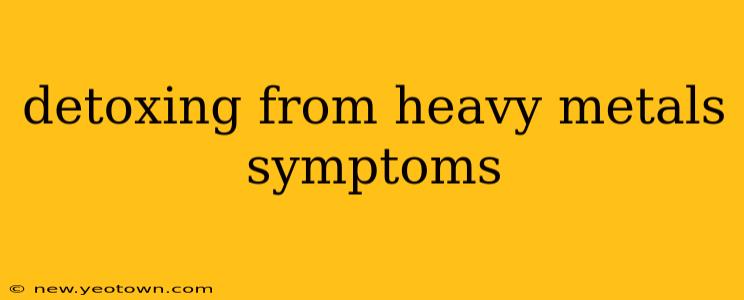Heavy metal toxicity is a serious concern, affecting millions worldwide. While our bodies have natural mechanisms for eliminating some metals, an overload from environmental exposure, industrial work, or even certain dietary choices can lead to a range of debilitating symptoms. This journey isn't a quick fix; it's a process that requires patience, understanding, and often, professional guidance. Let's explore the common signs, potential causes, and steps you can take to support your body's natural detoxification pathways.
What are the symptoms of heavy metal poisoning?
This is often the first question people ask, and understandably so. The symptoms of heavy metal toxicity are notoriously varied and can mimic other health conditions, making diagnosis challenging. They can range from subtle to severe, depending on the metal involved, the level of exposure, and individual sensitivities. Common symptoms include:
- Fatigue and weakness: This is often one of the earliest and most persistent signs. You might feel constantly drained, even after a full night's sleep.
- Headaches and migraines: Heavy metals can disrupt neurological function, leading to frequent and intense headaches.
- Gastrointestinal issues: Nausea, vomiting, diarrhea, and abdominal pain are common complaints.
- Cognitive impairment: Memory loss, difficulty concentrating, brain fog, and confusion are all potential symptoms.
- Neurological problems: Numbness, tingling, tremors, and muscle weakness can occur in more severe cases.
- Skin rashes and irritation: Dermatitis and other skin problems can be a manifestation of heavy metal toxicity.
- Immune system dysfunction: Frequent infections and a general feeling of being unwell are common.
- Kidney and liver problems: Heavy metals can damage these vital organs over time.
How can I tell if I have heavy metal poisoning?
It's crucial to understand that self-diagnosing heavy metal poisoning is impossible. These symptoms can overlap with many other illnesses. A proper diagnosis requires professional medical testing, which may include blood tests, urine tests, hair analysis, or more specialized procedures. Don't rely on online quizzes or anecdotal evidence. Seek advice from a qualified healthcare professional, ideally one experienced in environmental medicine or toxicology. They can accurately assess your symptoms and order the appropriate tests.
What are the causes of heavy metal exposure?
Exposure to heavy metals isn't always dramatic; it's often a slow accumulation over time. Common sources include:
- Environmental pollution: Air and water contamination from industrial activities, traffic, and other sources.
- Occupational exposure: Certain jobs, such as mining, manufacturing, and dentistry, involve higher risks.
- Food and water: Heavy metals can accumulate in certain foods (e.g., seafood) and water sources.
- Amalgam dental fillings: While the debate continues, some individuals believe mercury from these fillings can contribute to toxicity.
- Cosmetics and personal care products: Some products may contain traces of heavy metals.
What are some natural ways to detox from heavy metals?
While there's no magic bullet, several strategies can support your body's natural detoxification processes. It's important to emphasize that these should be considered supportive measures, not replacements for medical advice or treatment.
- Chelation therapy: This is a medical procedure involving medications that bind to heavy metals, aiding their excretion. This is a medical intervention and should only be undertaken under strict medical supervision.
- Dietary changes: Focus on a diet rich in fruits, vegetables, and whole grains to support liver and kidney function. Avoid processed foods, sugary drinks, and excessive alcohol.
- Hydration: Drinking plenty of clean water helps flush toxins from your system.
- Sauna use: Some evidence suggests that sweating in a sauna can help eliminate some heavy metals.
- Supplements: Certain supplements, like cilantro, chlorella, and activated charcoal, are often touted for their heavy metal binding properties. However, research on their effectiveness is ongoing, and their use should be discussed with your doctor.
Can I detox from heavy metals at home?
While you can support your body's natural detoxification processes through diet, lifestyle changes, and potentially some supplements, home detoxification methods should never replace professional medical guidance, particularly in suspected cases of heavy metal toxicity. At-home methods may not be effective against significant heavy metal buildup, and some can even be harmful if not done correctly. Always consult a doctor before attempting any detoxification regimen.
Are there any long-term effects of heavy metal poisoning?
The long-term effects of heavy metal poisoning depend on several factors, including the type and amount of metal, duration of exposure, and individual susceptibility. Long-term effects can be quite severe and may include:
- Chronic fatigue: Persistent tiredness and lack of energy.
- Neurological damage: Permanent cognitive impairment, tremors, or other neurological problems.
- Kidney and liver disease: These organs may be irreversibly damaged.
- Increased cancer risk: Some heavy metals are known carcinogens.
This information is for educational purposes only and should not be considered medical advice. Always consult a qualified healthcare professional for any health concerns. Early detection and appropriate medical intervention are crucial for managing heavy metal toxicity and preventing long-term complications.

